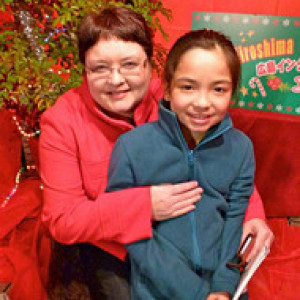Hirota, Rikuzentakata-shi
The jokey spirit of camaraderie of the 18 hour drive up to Tohoku turned to quiet when our 10 person team of volunteers from Hiroshima arrived at the site in Hirota.
The task we had been assigned was to clear the wreckage, cut back the weeds, and unblock the gutter of a 30m stretch of hillside which had provided a natural barrier to the tsunami of March 11th, which the actual 8m seawall, not 1km away from the place we stood, had been unable to halt.
The area between our hill and the sea was completely erased. All that could be seen were the bare concrete foundations of numerous houses, with neat piles of wreckage, separated into types, which had been left by volunteers before us, the odd completely mangled car, and the cracked remnants of the useless seawall.
We started on the left and worked along the hillside, making our own piles.
One for wood which had once been the frames of the houses.
One for roof tiles.
One for burnable things.
One for non burnable.
Things we pulled from the undergrowth and hanging from the tops of trees included: chairs, futons, toasters. televisions, sewing machines, clothes still pegged to the clothesline, textbooks, shampoo bottles, CDs,buoys, kitchen scales, jewellery, parts of the butsudan family shrines, wall and roof insulation, vinyl records, Hoover bags, fishing nets from boats, pencils, art, cameras, other totally unrecognisable items, clocks stopped at 3:35pm, the time when the tsunami must have arrived, and of course the most heartbreaking of all, the toys of the children who had lived in those houses.
We had one box set aside for anything we might find which was identifiable by its owners. At first we put in anything in good enough condition that might have been of personal value: ornaments, jewelry, toys in good condition, mementoes.
Then an elderly man from the neighbourhood came by to thank us for coming to help. He saw our "memories" box, and advised us to just throw most of them back on the rubbish heap: "There's no point in keeping them. It's not as if we will ever be able to find out who they belong to anyway" he said with a resigned shrug.
He went on to tell us what his experience was that day. His house was a few hundred metres away on slightly higher ground. After the violence of the earthquake, they knew it was coming, but there had been earthquakes and tsunamis before. They had a sea wall higher than their houses. He went out to pee in his field, as you do, he said with a smile, almost an hour after the quake. He saw it coming and watched as the sea quietly came in, filled up the bay, crashed into the hill, redirected up the valley a bit, then gave up and receded, sucking his next-door neighbours and all record of their existence with it. The entire family including 2 children who lived in the house that had been next to where we stood were washed away and died in an instant.
He said, "I just stood here and watched and said to no-one in particular: "oh!""
After that we kept the "memories" box for photos with people still recognisable in them and things with people's names on them.
The hardest thing was the kids toys. I found a sticker book exactly the same as one Mairi has, with same stickers in it.
10% of the population of Rikuzentakata disappeared that day. That's about 2,600 people. The lines between which houses and families were destroyed and which were spared was stunningly arbitrary. You can see clear lines through the city: the tsunami devastated one side of the street; the other side has no damage whatsoever.
It doesn't make anything any better, but I still hope the baby in the photo was one of the lucky ones.
I do not write this to make a melodrama out of these people's situation. There are plenty positive scenes of rebuilding and resilience to be told too. They are helping themselves. But they still need help, and they will need it for a long time. And everyone is beginning to forget. The Red Cross money is not getting through. They are getting things. They need cash. If you can spare any, please give it to someone who will get it there.
- 0
- 0
- Apple iPhone
- f/2.8

Comments
Sign in or get an account to comment.


